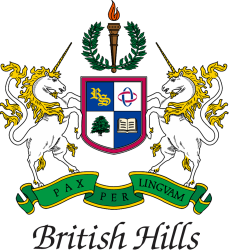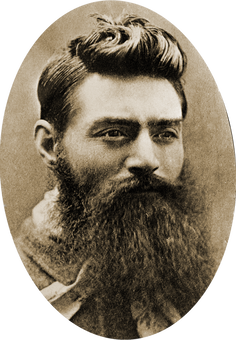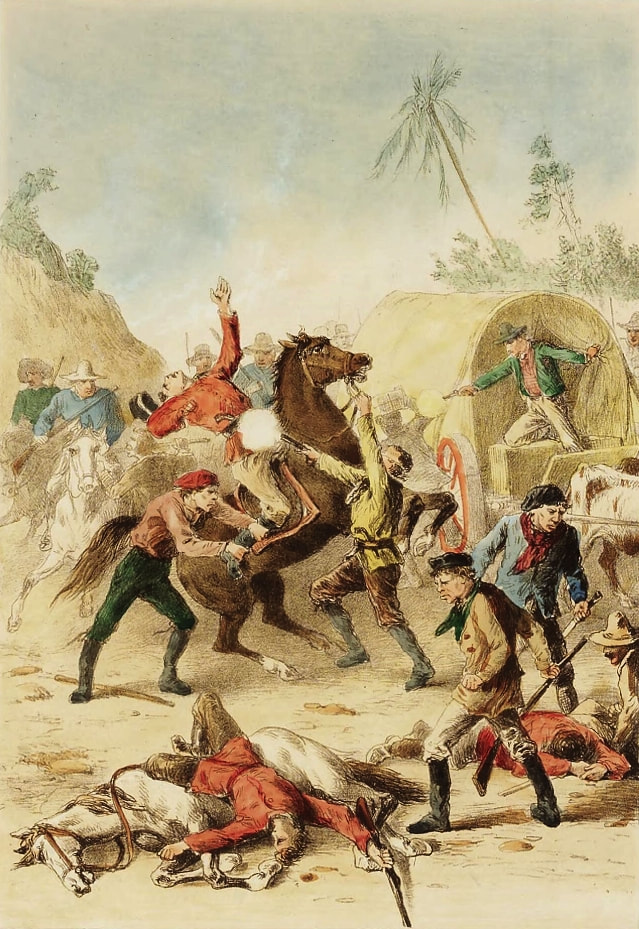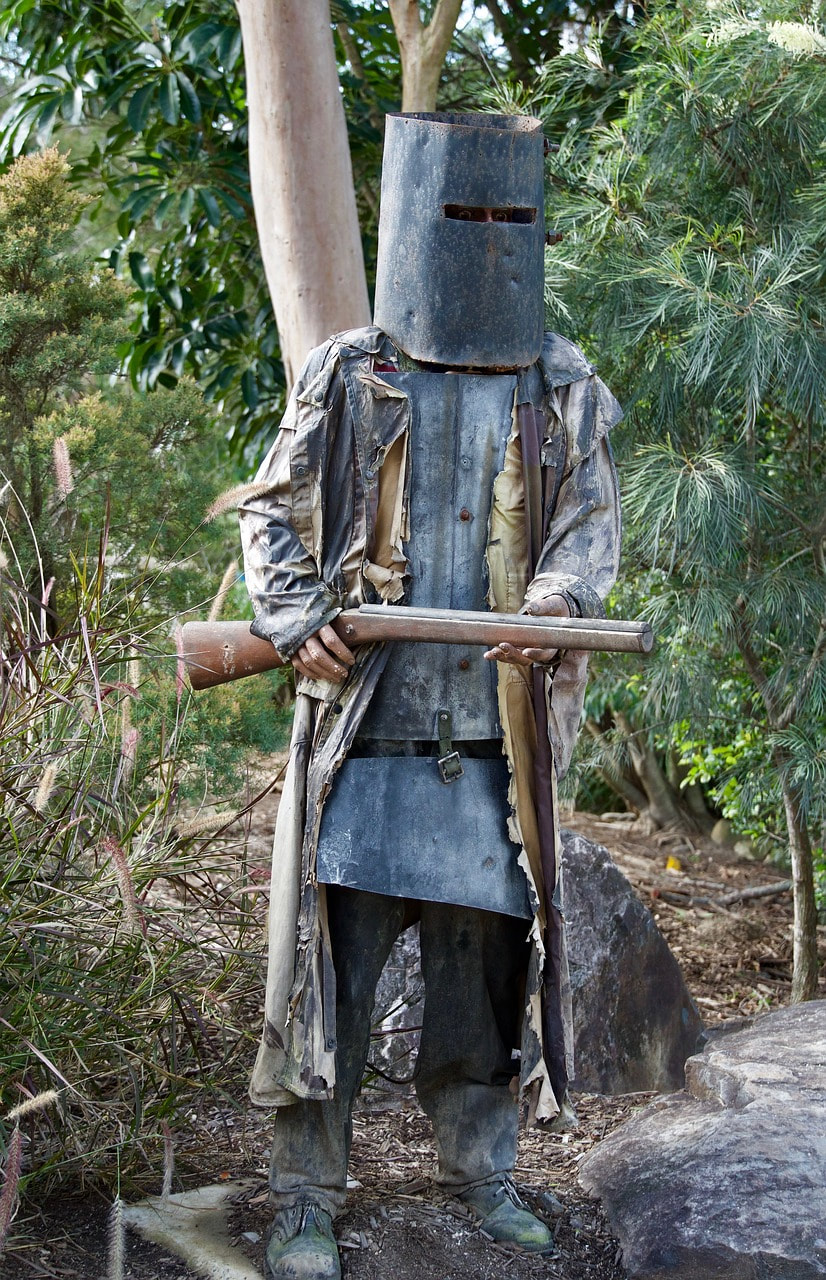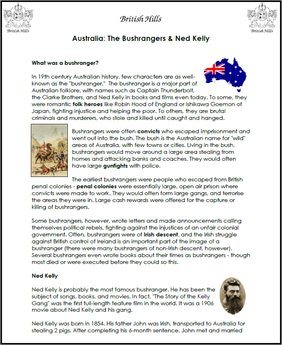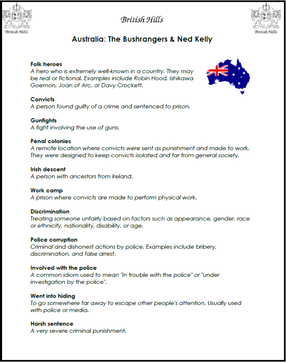Australia: The Bushrangers & Ned Kelly
How much do you know about the bushrangers of Australia? Find out here, and test yourself with our worksheets and quizzes!
|
What was a bushranger?
In 19th century Australian history, few characters are as well-known as the "bushranger." The bushranger is a major part of Australian folklore, with names such as Captain Thunderbolt, the Clarke Brothers, and Ned Kelly in books and films even today. To some, they were romantic folk heroes like Robin Hood of England or Ishikawa Goemon of Japan, fighting injustice and helping the poor. To others, they are brutal criminals and murderers, who stole and killed until caught and hanged. Bushrangers were often convicts who escaped imprisonment and went out into the bush. The bush is the Australian name for "wild" areas of Australia, with few towns or cities. Living in the bush, bushrangers would move around a large area stealing from homes and attacking banks and coaches. They would often have large gunfights with police. The earliest bushrangers were people who escaped from British penal colonies - penal colonies were essentially large, open air prison where convicts were made to work. They would often form large gangs, and terrorise the areas they were in. Large cash rewards were offered for the capture or killing of bushrangers. Some bushrangers, however, wrote letters and made announcements calling themselves political rebels, fighting against the injustices of an unfair colonial government. Often, bushrangers were of Irish descent, and the Irish struggle against British control of Ireland is an important part of the image of a bushranger (there were many bushrangers of non-Irish descent, however). Several bushrangers even wrote books about their times as bushrangers - though most died or were executed before they could so this. Ned Kelly became involved with the police from a young age. His first trouble was when he was only 14, and accused of attacking a Chinese man named Ah Fook. As with everything in Ned Kelly's life, there are different versions.
In the first version, Ned Kelly attacked the Chinaman and robbed him - some of Ned's later writings are very anti-Chinese, and this is used as evidence of this version. In a second version, Mr. Fook asked for water and was angry when Ned's sister gave him dirty creek water, not clean water, and Ned attacked him. In a third version, Mr. Fook was a police spy investigating Ned's mother for selling alcohol. Either way, Ned was found innocent of the crime, but would end up in prison twice before he was 18 for horse-theft and assault. The real start of Ned's story as a bushranger began in 1878, when a policeman named Fitzpatrick went to arrest Ned Kelly's brother, Dan Kelly. According to the policeman, Ned shot him in the arm. According to Ned and his family, Ned was 200 miles away and the policeman shot himself. After the event, Ned and Dan went into hiding, believing they could not trust the police or courts. Their mother, however, was sentenced to 3 years in prison - a harsh sentence that shocked many people. Over the next two years, Ned, Dan, and some friends formed "Kelly's gang." Now they were real bushrangers, and committed bank robberies and at least 7 murders of policeman and others. At the same time, however, the police response caused anger and support for Kelly's gang. At one time, over 20 sympathisers of Ned Kelly were arrested without evidence of any crime. Also, the gang stated that they did not rob innocent travellers, and gave the stolen money from the banks away to others. During this time, Ned Kelly wrote the "Jerilderie Letter," an 8000-word letter which justified his actions as a rebellion against corrupt English authority, just like rebellions in Ireland. He protested police corruption, and stated that he was fighting for poor families. |
Ned Kelly
Ned Kelly is probably the most famous bushranger. He has been the subject of songs, books, and movies. In fact, "The Story of the Kelly Gang" was the first full-length feature film in the world. It was a 1906 movie about Ned Kelly and his gang. Ned Kelly was born in 1854. His father John was Irish, transported to Australia for stealing 2 pigs. After completing his 6-month sentence, John met and married Ned Kelly's mother, Ellen. However, soon after Ned was born his father was arrested again - this time for having meat that he could not prove he owned. A fine of £25 was demanded. When John could not pay this, he was again sent to a work camp. This prison badly affected John's health, and soon after leaving this prison he died. There is evidence that Ned Kelly's family experienced discrimination from the police and others. However, the evidence is unclear, though Ned's story includes many examples of police corruption. In the most romantic versions of Ned's story, he was fighting against an unfair system and corrupt police. The end of the Kelly gang was extremely dramatic. Preparing for a gunfight with police, the gang took control of the small town of Glenrowan by taking 62 people hostage. Famously, while waiting for the police to arrive they made these hostages dance and drink, as if at a party.
The four gang members had made suits of armour out of farming equipment, which they used to protect themselves during robberies. They wore these during the gunfight with a large number of police. During this fight, at least four hostages were killed. Of Kelly's gang, only Ned Kelly survived. The others all died violently. Ned Kelly was captured, bleeding from his armour, and arrested. After a trial in Melbourne of national interest, he was convicted. Thousands of people demonstrated against this conviction, showing the image that Ned Kelly had in the popular imagination . He was, however, hanged on November 11th 1880, aged 25. |
What do you think these words mean?
Read the information above and make definitions for these terms:
Answers:
|
